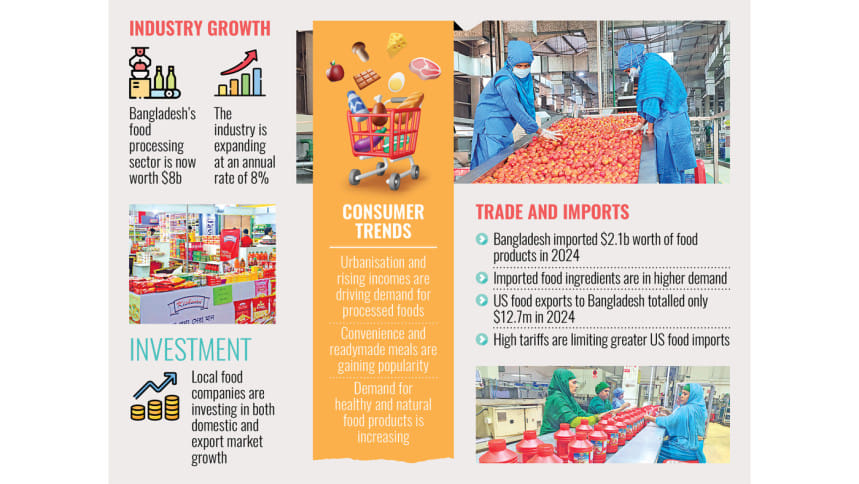Bangladesh’s food processing market hits $8b

Bangladesh's food processing sector, which was worth $8 billion last year, is growing at an average rate of 8 percent a year, according to a report by the United States Department of Agriculture (USDA).
A growing urban middle class and shifting lifestyles are the key forces behind the expanding processed food market, it said, adding that the expanding market in Bangladesh offers export opportunities for producers of food ingredients in the US.
According to the latest Exporter Guide Annual report by the USDA, as demand for convenience foods increases, so does the need for quality ingredients in both food preparation and manufacturing.
The report, published on June 16, noted that Bangladesh imported consumer-oriented agricultural products worth $2.1 billion from global markets in 2024. Of this, US exports accounted for just $12.7 million, less than one percent of the total.
Bangladesh imported consumer-oriented agricultural products worth $2.1 billion from global markets in 2024. Of this, US exports accounted for just $12.7 million
According to the USDA, the food processing industry in Bangladesh includes about 1,000 companies producing a wide range of goods, such as snacks, ready-to-eat meals, frozen items, dairy products, and beverages.
The sector is described as highly competitive, with local firms raising investment to serve both domestic consumers and export markets.
Rising incomes, rapid urbanisation, and growing participation of women in the workforce are helping to drive lifestyle changes. This, in turn, is fuelling demand for processed fruits, juices, chocolates, nuts, fresh vegetables, spices, meats, tea, sauces, dairy goods, bakery items, and convenient ready-made meals.
Among US consumer-oriented exports to Bangladesh in 2024, dairy products led the way at $4.8 million, followed by tree nuts at $4 million, food preparations at $2.7 million, condiments and sauces at $0.5 million, and processed vegetables at $0.18 million.
The country's dairy market is estimated to be worth $3 billion. Locally produced milk, around 14 million tonnes, supports the liquid milk segment, while 311,000 tonnes of imported dairy products go into the value-added dairy industry. US dairy exports to Bangladesh totalled $4.8 million last year.
Although there is clear demand for US food ingredients and products, high tariffs continue to pose a major hurdle, said the USDA.
The report points out that the total tax incidence on dairy products ranges from 31 to 58.6 percent. Food preparations face an even higher rate, with tariffs between 58.6 and 89.32 percent.
Processed fruit imports, especially dates, have been climbing steadily over the past five years. US Medjool dates see strong demand during Ramadan, although they attract a tariff of 63.6 percent.
Similarly, imports of fruit and vegetable juices are rising, despite taxes that can reach up to 89.32 percent.
The report mentions that consumers in Bangladesh are becoming increasingly health-conscious. Interest is growing in products seen as natural or good for health, boosting demand for items like tree nuts, coffee, condiments, sauces, and other imported goods.
Despite challenges such as high import duties, weak cold chain logistics, and cumbersome customs processes, demand for imported, high-quality ingredients remains strong. This is driven by both consumer preferences and the needs of manufacturers.
Taslim Shahriar, deputy general manager of Meghna Group of Industries, one of Bangladesh's leading commodity importers and processors, said the report captures the reality of the country's thriving food processing sector.
"We are witnessing the rise of an urban middle class with increasing incomes and changing lifestyles, driving strong demand for high-quality imported ingredients such as dairy products, tree nuts, and processed fruits," he said.
Shahriar added that although high tariffs and logistical issues present challenges, the sector's growth potential offers exciting prospects for international suppliers.
"Bangladesh is steadily emerging as a significant player in the global food market," he said.
Kamruzzaman Kamal, marketing director at Pran-RFL Group, said Bangladesh's food processing industry is showing remarkable growth, driven by urbanisation, rising incomes, and shifting consumer lifestyles.
Local processors are stepping up investments in value-added production to serve both domestic and export markets, signalling competitive pressure and innovation, he added.
The market's tilt towards health-conscious and convenience-oriented products also opens new niches. To capitalise on this, policy reforms on tariff structures and improvements in cold chain infrastructure are essential, he added.

 For all latest news, follow The Daily Star's Google News channel.
For all latest news, follow The Daily Star's Google News channel. 



Comments